Dr. Ashwini Bhave’s goal is to offer the most advanced solutions to common dental problems, including tooth loss. Dental implants are considered the standard of care for the replacement of missing teeth. An implant recreates the entire structure of a natural, healthy tooth, including the root and crown. Anchored in the jawbone, implants restore a complete smile and full chewing and biting function.
Why Choose Dr. Bhave for Dental Implants?
The restoration and replacement of teeth with dental implants requires the skill and experience of a highly trained prosthodontist like Dr. Bhave. She specializes in the replacement of missing or broken-down teeth. She honed her leading-edge skills in dental implant treatment with a year-long, full-time training fellowship program in dental implant surgery.
With her advanced training, Dr. Bhave is able to perform all aspects of dental implant planning and placement in our office, saving you from the inconvenience and expense of visiting different specialists to complete your treatment.
How Do Dental Implants Work?
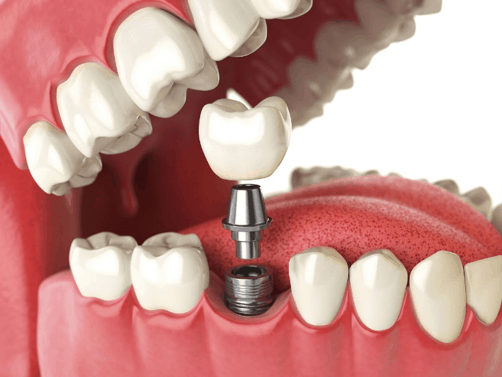
Dental implant posts are surgically placed in the jawbone beneath the gap left by the missing tooth. The posts can support an individual tooth (usually a crown) or stabilize a dental bridge, partial or complete denture prosthetic. The replacement teeth are carefully crafted to match the surrounding natural teeth in color, shape and size. When planned and placed correctly, dental implants are virtually indistinguishable from natural teeth!
Advantages of Dental Implants
Implants are the next best thing to real, healthy teeth for the following reasons:
- Implants are the only restoration anchored in the jawbone, providing unparalleled strength and stability. The jawbone grows around the implant post, holding it in place.
- Implants allow you to chew your food thoroughly, without pain or discomfort.
- The placement of the implant post in the jawbone helps to stimulate the bone. When teeth are missing for a prolonged period of time, the bone can resorb and deteriorate, resulting in loss of jawbone height. Keeping the bone stimulated with an implant prevents these complications.
- Implants are self-sufficient and do not attach to the surrounding teeth or rely on them for support. This helps keep the surrounding teeth completely intact and strong.
- Implants prevent the surrounding teeth from shifting or drifting around in the mouth and causing problems with bite alignment or chewing ability.
- Implants can be brushed and flossed just like natural teeth, and cannot develop cavities.
- With the proper placement, care and attention, implants can be a permanent solution to tooth loss.
- Implants have an extremely high success rate. The techniques and technology used to plan and place implants continue to improve.
Dental Implant Procedure Details & Timeline
Getting a dental implant requires several dental appointments. It can take up to a few months to complete the process.

Preparing for Implant Placement
Some patients require jawbone grafting to build up areas of weak jawbone so they can sufficiently retain and support an implant post. Dr. Bhave uses the latest materials and techniques to make this process minimally invasive and efficient.
Other patients require gentle extractions to remove broken-down or failing teeth. Dr. Bhave performs extractions in a way that preserves the maximum amount of surrounding gum and bone tissue, and speeds healing by minimizing any trauma or swelling.
These procedures are performed prior to implant placement.
Planning Out Implant Placement
Dr. Bhave carefully plans out the entire implant placement process using leading-edge technology. To start, she takes digital images and a three-dimensional CT scan of your mouth to look at your teeth, jawbone and surrounding structures. Then, she maps out the exact position and angle of the insertion of each implant.
Implant Placement
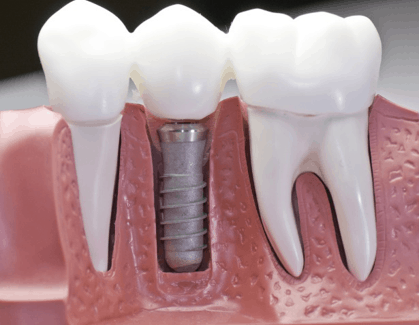
Using a surgical guide as a template to mark where and at what angle the implant should be inserted, Dr. Bhave places the implant. She uses a groundbreaking technique called osseodensification that compacts and densifies the jawbone rather than cutting it. Sometimes this technique eliminates the need for bone grafting altogether, expediting the implant placement process.
After the post or posts have been placed, Dr. Bhave cements the replacement tooth or teeth into place, ensuring a great fit and feel.
Dr. Bhave and our team take great measures to help you feel comfortable and relaxed throughout treatment. Every step will be explained to you in detail so you know what to expect. Dr. Bhave uses minimally invasive techniques to reduce the risk of discomfort and accelerate your healing time. Sedation dentistry may be involved if needed for your comfort and relaxation.
Types of Dental Implants
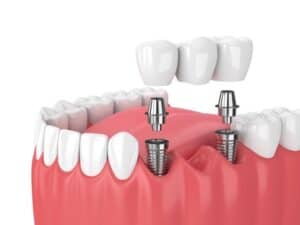
Dr. Bhave offers the All-on-4® New Teeth in One Day, a revolutionary option for implant-supported dentures to replace an arch of missing teeth in the upper or lower mouth in a single visit to our office. The All-on-4® replaces an entire line of teeth using four dental implants strategically placed to support the artificial replacements. The revolutionary procedure can get rid of your removable dentures and provide a functional, supported set of teeth that won’t irritate your gums and help to maintain strong jawbone integrity.
Our prosthodontist, Dr. Bhave, is a skilled implant dentist who completed an extra three years of training and residency. She went through a year-long fellowship in dental implant surgery and will carefully plan and execute your implant plan whether you have one or multiple missing teeth
How to Care for Dental Implants
Caring for your dental implants depends on the type of dental restoration. If you have a single dental implant to replace one missing tooth, your dental hygiene routine will differ from someone with All-on-4® New Teeth in One Day. Single implants can be cared for just like your natural teeth. Brush with a soft-bristled toothbrush and low-abrasive toothpaste twice a day and floss once a day, and make sure you gently brush around and under the crown of the dental implant.

If you struggle with remembering to floss, you can carry extra floss containers in your purse and car, set a reminder on your phone or floss while you watch TV. Some people do better with flossing if they reward themselves with something like an extra episode of their favorite series.
An implant-supported denture or implant-supported bridge also requires brushing. Dr. Bhave may recommend a water flosser for these dental restorations to ensure bacteria is washed away without affecting the integrity of the bridge or denture. She and our Bay Area Dental Specialists team will explain how to care for your implant-supported bridge or denture.
Regardless of your dental implant type, you will want to stay away from sticky and hard foods because they can cause chips or cracks in your natural teeth and dental implants. These foods include hard candy, ice, caramel, dried fruit and crusty bread. The dental implant is stain resistant, but your adjacent teeth can still stain from wine, tea and coffee consumption. Alcohol and smoking can affect dental implants, especially if you smoke while your mouth is still healing.
To ensure that you enjoy your dental implants for decades to come, remember to come in for regular dental visits to maintain good oral health.
Will I Need a Bone Graft Before Dental Implants?
Many people with missing teeth have bone resorption, which occurs when the lack of stimulation from the missing tooth root causes the jawbone to recess and weaken. Bone resorption alters your facial shape and often leads to further tooth loss. A dental bone graft is necessary if bone loss affects the teeth around the gap of the missing tooth.
The bone graft uses tissue from a human, animal or synthetic material to restore density and volume in the jaw. Your body repairs the tissues using the graft as a scaffold for strengthening and regenerating the jawbone.
Questions to Ask Our Dentist About Dental Implants
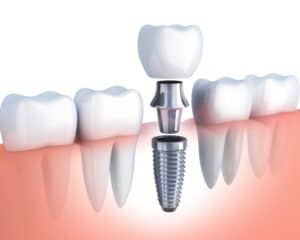
- What are my options for replacing missing teeth with dental restorations?
- What are the advantages of dental implants?
- How long is the dental implant process?
- Am I a good candidate for dental implants?
- What can I expect after the dental implant procedure?
- How many days do I need to take off work?
- How long do dental implants last?
What Our Patients Have to Say About Dr. Bhave
“Dr. Bhave and her staff were a complete dream team. They brought my smile to a place I’ve always hoped for. Dr. Bhave was patient during the entire process, explaining what came next in the process every step of the way. She and her team were always intentional to make sure I was comfortable during every treatment. In addition to taking great care of me as a patient, I enjoyed going to her office for each visit. The environment is very clean and welcoming.
The level of expertise and professionalism was honestly impressive from beginning to the end. I had tons of questions regarding my treatment plan, and she was always willing to have a dialogue with me at the level I could understand. I quickly began to trust their expertise and input on my treatment, and I’m extremely happy with the final results.
So thankful for Dr. Bhave and her staff for improving my quality of life.” – Bryan Hobbs
Dental Implant FAQs
How long does the process take?
Patients can complete a dental implant procedure in as few as three appointments spaced over three months, though fortunately your total time in the dentist’s chair is not much different than required for other major dental procedures. The reason for the extended wait between appointments is that your mouth needs enough time to heal from the bone fusing and securing the new implant. Some patients will need either jaw surgery or bone grafting for a dental implant, which could extend the entire process to about six months in total.
How durable are dental implants?
Thanks to the latest technological advancements, dental implants are sturdier and longer lasting than ever before. Odds are that your dental implant will actually be stronger than the tooth it has replaced. Research demonstrates that implants will last at least 30 years in more than 95 percent of patients. For those patients who have all of their teeth replaced with implants, the success rate is somewhere between 80 to 90 percent.
How many dental implants can I receive?
There is no limit to the number of tooth implants a patient can receive: some will have one or two, while others may get a full mouth restoration. Implants can also be used to help secure a bridge. Using as few as two implants, Bay Area dentist Dr. Ashwini Bhave can provide a row of artificial teeth for either the upper or lower mouth.
Is the process painful?
Because Dr. Bhave uses local anesthetic during a dental implant procedure, patients report less discomfort than they would during tooth extraction. Intravenous sedation is also available upon request. Once the anesthesia wears off, patients will start to experience some pain while back at home, though that pain can be effectively managed with the medication that Dr. Bhave has prescribed to them.
Why are dental implants superior to dentures?
Many patients prefer dental implants because they look and feel more like natural teeth. Unlike dentures, implants do not need to be removed for cleaning and can be brushed and flossed as if they were normal teeth.
Because implants are firmly attached to your jawbone, they do not slip around like dentures are sometimes known to do. That means not having to worry about your teeth coming out while sharing a meal or conversation with friends.
Finally, dental implants’ titanium posts serve the same purpose as natural teeth roots, helping to stimulate the jawbone. This stimulation protects against bone loss and prevents against sunken-in facial features that can happen in patients with missing teeth.
What are All-on-Four dental implants?
As the name suggests, All-on-Four is a set of artificial teeth that are held in the mouth by just four dental implants. They are custom-made to fit your mouth and securely attached for natural-looking, functional teeth. All-on-Four begins like any dental procedure: the surgical insertion of titanium posts into the bone. You will wear a temporary dental arch until the laboratory creates your permanent set and your mouth has healed from the implant surgery.
Schedule a Dental Implant Consultation With Dr. Bhave
If you are interested in replacing a missing or failing tooth with a beautiful, strong dental implant, Dr. Bhave invites you to learn more during a one-on-one consultation. Contact our practice today to request an appointment.
